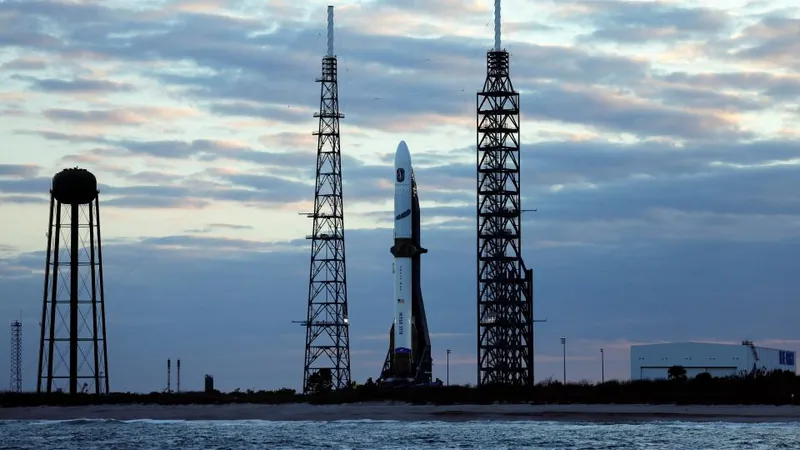
Blue Origin's New Glenn Rocket: A Game-Changer for Space Launch Services Set for Historic Debut!
2025-01-11
Author: Ming
After nearly 25 years since its founding by Jeff Bezos, Blue Origin is gearing up for a monumental moment: the inaugural launch of its New Glenn rocket, a potential game-changer in the competitive world of space launches. This rocket, designed to challenge SpaceX's dominance in the commercial space sector, is scheduled for liftoff at 1 a.m. ET Monday from Cape Canaveral Space Force Station, Florida. Fans and followers can catch a live stream of the event on social media platform X, Blue Origin's YouTube channel, and its official website one hour prior to the launch.
Launch Hiccups: Weather Delays New Glenn's Liftoff
The New Glenn was originally set to launch on Sunday but was delayed by a day due to unfavorable weather conditions at sea, impacting the rocket's recovery operations. Ensuring that the conditions are optimal for recovery is crucial since part of Blue Origin's strategy is to reuse rocket components to reduce costs, similar to SpaceX's method.
The Power of New Glenn: A Heavy-Lift Launch Vehicle
Standing at approximately 320 feet (98 meters), New Glenn is designed to be a heavy-lift vehicle capable of transporting satellites into orbit more efficiently than ever. What sets it apart is its sheer power; it boasts over twice the thrust of SpaceX's Falcon 9 during takeoff, positioning itself as one of the most formidable rockets in the world.
For this landmark mission, New Glenn will carry a payload called the Blue Ring Pathfinder, which is meant to test Blue Origin's proprietary technologies designed to improve future missions.
The Countdown: What to Expect During the Flight
Once launched, New Glenn will ignite its seven BE-4 engines, propelling it through the atmosphere. Moments into the flight, the first-stage booster will detach, utilizing its guidance systems to navigate towards a specialized recovery platform named Jacklyn, after Bezos's mother.
As the mission continues, the rocket's upper stage will execute a series of complex maneuvers, using two space-optimized engines to reach orbital speeds of approximately 17,500 miles per hour — nearly 23 times the speed of sound.
Importantly, while Blue Origin aims to demonstrate the craft's orbital capabilities during this test flight, it won’t be deploying any satellites. Instead, the Blue Ring Pathfinder will remain attached to the upper stage throughout the mission's duration.
A High-Stakes Launch: Challenges Ahead
While the excitement builds, the stakes could not be higher. Success is crucial, but it's not guaranteed. The New Glenn has only undergone a limited ground test of the BE-4 engines previously, and this flight will demand sustained performance far exceeding that initial test duration. Any anomalies could force a self-destruct protocol to ensure safety.
Even if the upper stage successfully reaches orbit, challenges may persist in landing the booster back on the recovery platform. However, recovering the booster is not the end-all for mission success; the primary focus will still be on the orbital capabilities of the New Glenn.
The Future of Space Launches: Blue Origin's Competitive Edge
If Blue Origin successfully launches New Glenn and demonstrates its capabilities, it may well establish itself as a significant competitor in the commercial launch industry. Experts affirm that large launch vehicles are growing increasingly vital in today’s aerospace market as demand surges for reliable satellite deployment.
Caleb Henry, director of research at Quilty Space, remarked, "They are positioned to become the next great, reliable launch provider for the industry." As satellite sizes increase and the need for heavy-lift capabilities expands, New Glenn could capture a significant market share.
In a space race increasingly dominated by SpaceX, Blue Origin is poised to redefine launch possibilities with New Glenn. With the potential for reusability and unmatched power, the space industry might be on the precipice of a new era. Will Blue Origin's latest rocket succeed in disrupting the current status quo? Only time will tell!



 Brasil (PT)
Brasil (PT)
 Canada (EN)
Canada (EN)
 Chile (ES)
Chile (ES)
 Česko (CS)
Česko (CS)
 대한민국 (KO)
대한민국 (KO)
 España (ES)
España (ES)
 France (FR)
France (FR)
 Hong Kong (EN)
Hong Kong (EN)
 Italia (IT)
Italia (IT)
 日本 (JA)
日本 (JA)
 Magyarország (HU)
Magyarország (HU)
 Norge (NO)
Norge (NO)
 Polska (PL)
Polska (PL)
 Schweiz (DE)
Schweiz (DE)
 Singapore (EN)
Singapore (EN)
 Sverige (SV)
Sverige (SV)
 Suomi (FI)
Suomi (FI)
 Türkiye (TR)
Türkiye (TR)
 الإمارات العربية المتحدة (AR)
الإمارات العربية المتحدة (AR)